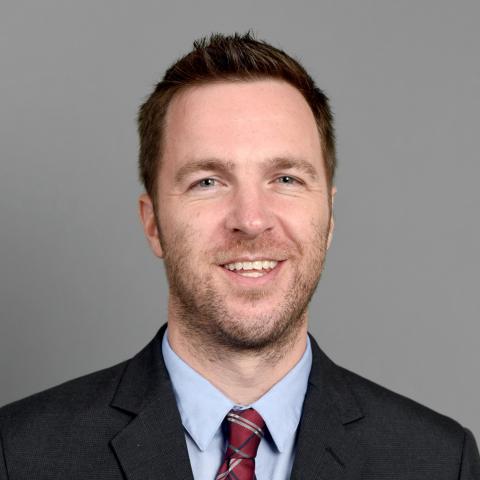
Outstanding Faculty Mentors

Kevin Wright
School of Criminology and Criminal Justice, Watts College of Public Programs and Community Solutions
Bio
Kevin Wright is an Associate Professor in the School of Criminology and Criminal Justice and Director of the Center for Correctional Solutions. His work focuses on enhancing the lives of people who live and work in our correctional system through research, education, and community engagement. He has developed and implemented a number of innovative courses at ASU, to include a course on getting out and staying out of prison delivered to high school students, a project-based learning course delivered to freshman culminating in a prison art show to benefit youth community organizations, multiple Inside-Out Prison Exchange Program courses delivered in men’s and women’s prisons, a correctional policy and programming graduate seminar delivered half-time at ASU and halftime in a prison, and most recently a graduate seminar titled “Punishment Reimagined” that conceives of incarceration as an opportunity to repair harm, empower people, and promote public safety. The Center for Correctional Solutions seeks to enhance the lives of students through empowerment, deliberate practice, and service to others. This award reflects the efforts of the many students, faculty, staff, and community members who contribute to and support that mission at ASU.
Mentoring Statement
I have a deep commitment to support my students in their professional development and career advancement. In my 10 years at ASU, I have chaired or been a part of 14 PhD committees, 20 master’s committees, 12 Barrett Undergraduate Honor’s theses, 14 Undergraduate Research Fellowships, 5 Barrett Honors Fellowships, 7 directed studies, and 2 Spirit of Service Scholars. Graduate students are project leads on my funded research, and I have supported 7 graduate students for the past 2 years (3 fully funded with tuition), with 11 total students receiving funding over the past 2 summers. I have over 20 journal articles, book chapters or handbook entries with student co-authors. Nearly all of my articles post-tenure have had student co-authors and they are most often lead author, no matter how much work that I may contribute. I prioritize student success over my own and I genuinely prefer it that way.
I believe, however, that the professional development of students should be a baseline responsibility for faculty and that true mentoring takes shape in providing the support and encouragement for students to create meaningful futures for themselves. In spring of 2018 I developed and launched a research center in the ASU School of Criminology and Criminal Justice. It was important to me in creating the center that it be ‘radically student-centered’ and so we
created a mission statement to demonstrate this commitment: Enhancing the lives of students through empowerment, deliberate practice, and service to others. We embrace a culture of support whereby faculty and students of all levels can teach and learn from one another.
Mentoring, and enhancing the lives of students, has changed for me in two important ways in 2020. First, the global pandemic of COVID-19 has impacted the way that graduate students learn and work, with increasingly uncertain employment futures coexisting alongside concerns for the health and safety of loved ones. Second, the systemic racial discrimination seen in the streets of America has also been made more visible in the educational institutions of America, and graduate students
of color fighting for equality and social justice could inspire all of us to reconsider how we might contribute to the problem and more importantly, to the solution.
I try to remember what it was like to be a graduate student, constantly searching for opportunities to check in with students to ensure they feel supported in their work. And I try to focus on diversity and inclusion, collaborating with students of all racial, ethnic, religious, geographic, and sexual orientation backgrounds as part of the mentor/mentee relationship. But 2020 has felt different. I sense more anxiety and despair in my students. I have set aside my work and my well-being to focus on the well-being of my students. I have set up virtual check-in community conversations with our graduate students and graduate students from around the nation. I have sought out and completed training and listened to discussions on inclusion and creating safe spaces for dialogue offered by the Creativity, Place and Equitable Communities Faculty Academy, ASU Faculty Women’s Association, and ASU Leadership Network. I have sat down with students of color in our program and listened to their experience and how we can make ASU a better place to learn. I have invited scholars to speak to our students about how we can make our center a more inclusive space. I have frequently reached out to all students in my graduate seminar to check in—whether I am their formal mentor or not—and I have had plenty of one-on-one conversations that have little to do with professional development and everything to do with identifying ways to overcome isolation, alienation, and uncertainty. Right now, all faculty have a responsibility to expand our capabilities and opportunities to enhance the lives of students.
Jim Nowak was my high school sociology teacher and is the earliest person in my life who I would identify as a mentor. I think often about the qualities that made him so influential in my life, and I can capture those qualities in a mantra: if it’s important to you, then it’s important to me—so let’s figure this out. I love this mentality. It shows support, authenticity, flexibility, commitment to collaborative action, and a purpose to life that exists outside of oneself. I have no desire to replicate myself through my mentees. This is my mentoring philosophy, and I am excited to ‘figure things out’ with many more students at ASU as we thrive together through these challenging times.